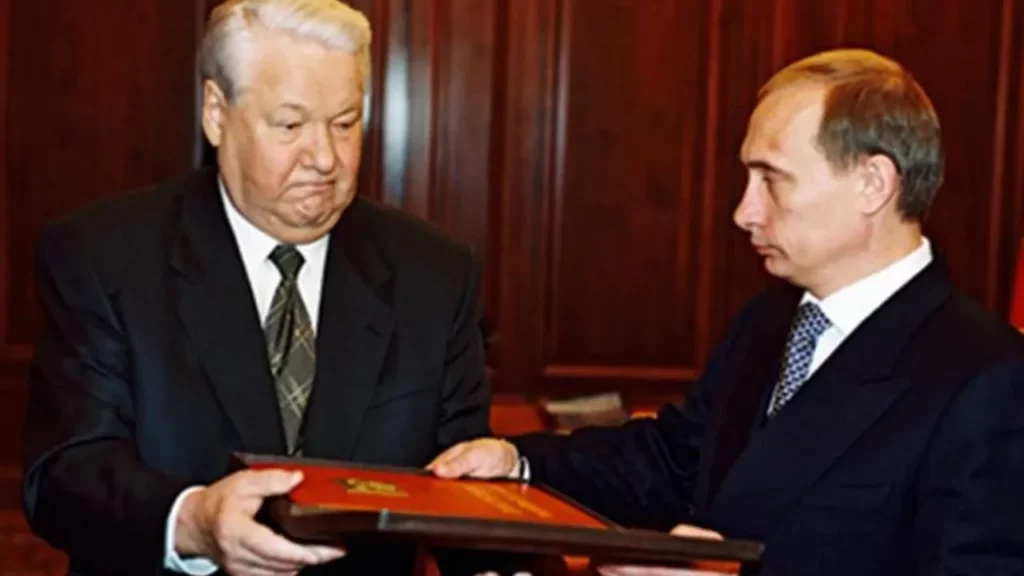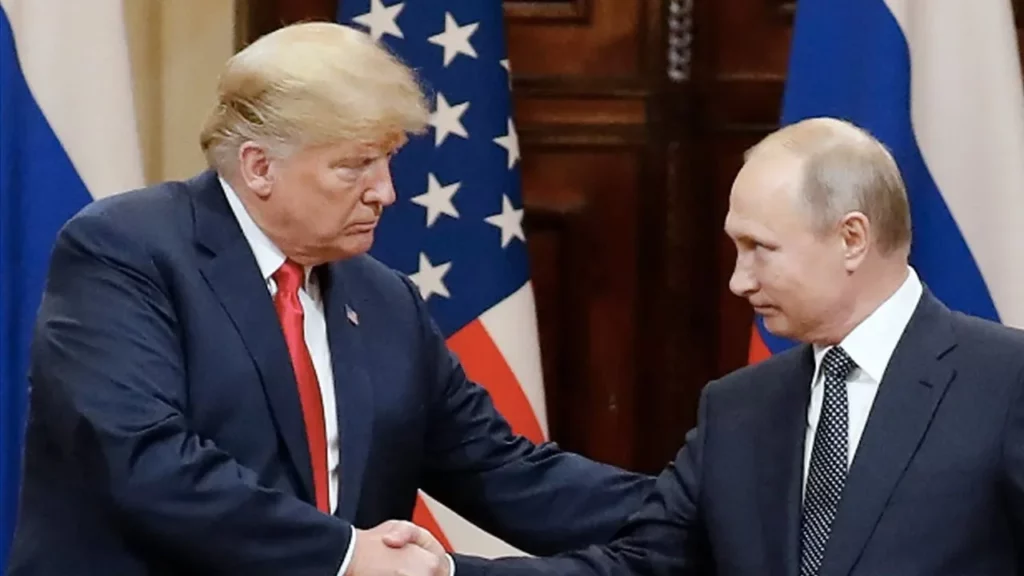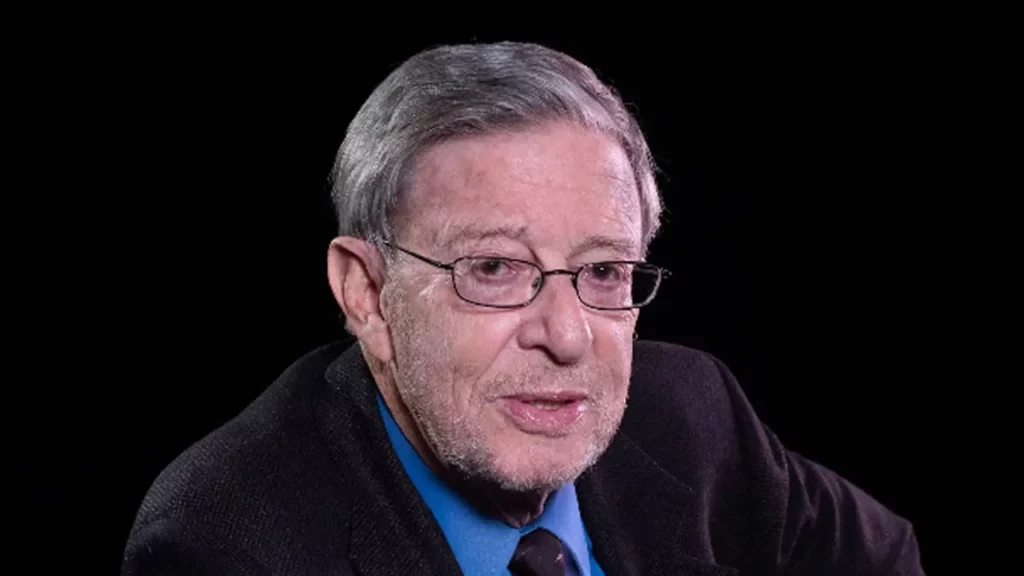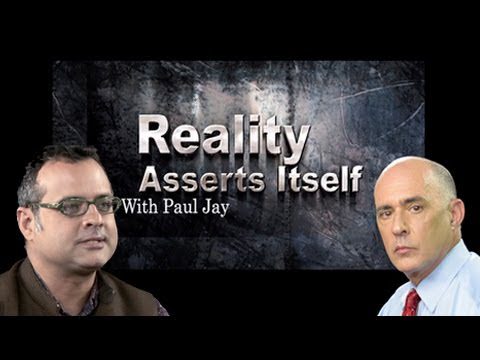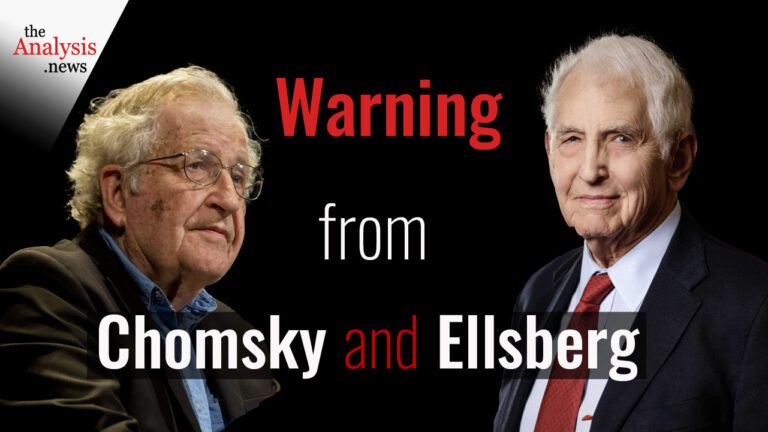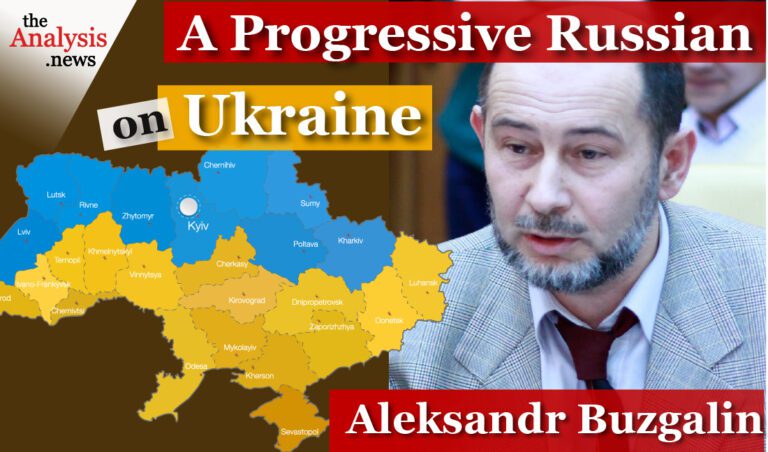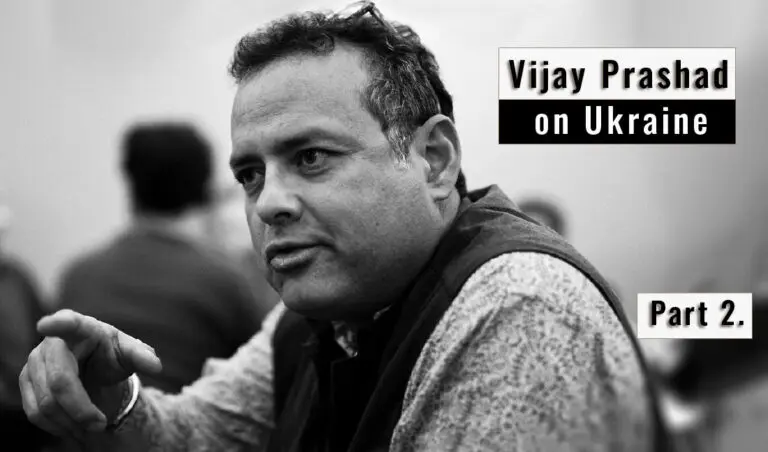This is an episode of Reality Asserts Itself, produced May 6, 2019, with the late Stephen Cohen. “I realized it wasn’t the Soviet Union that was the great danger, it was the potential of nuclear war, and it’s still the case today” – says Stephen Cohen.
STORY TRANSCRIPT
PAUL JAY: Welcome back to Reality Asserts Itself on The Real News Network. I’m Paul Jay, and we’re continuing our series of discussions with Stephen Cohen. And his biography is down below the video player, and you really should watch the first few segments, anyway, and you’ll get where we are.
Thanks for joining us again.
STEPHEN COHEN: Thank you.
PAUL JAY: In ’58 you seem a little oblivious to the Soviet Union as the existential threat. Like, in your conversation there, your story, you’re not going to a place that’s out to dominate the world. I mean, you don’t seem to have the Cold War psyche. Is that true?
STEPHEN COHEN: I don’t know. Maybe I was too busy chasing girls, maybe, down in Kentucky. People were too busy hating on blacks for me to focus on the communist threat. Though I should say that at the high school in this town, Owensboro, Kentucky, ROTC was obligatory. High school. It was also obligatory when I got to Indiana University. So remember these times. ROTC wasn’t an option. It was obligatory. If you stayed in college after two years and did four years, you got commissioned as a second lieutenant in the army. It was a way of the army getting young officers, and other people were avoiding the worst of the draft. But I don’t know, it didn’t seem to be–Russia didn’t seem to be this looming threat down there. I mean, it wasn’t until later in life I encountered it, first at the university and then in New York.
I mean, maybe–I know that McCarthyism because of my wife, Katrina vanden Heuvel, the editor and the publisher of the Nation, soon to be the editorial director and publisher of The Nation, she did a lot of research on the McCarthy era as a student and later when she was working as an independent journalist. And it took her to places like West Virginia to meet victims of people who’d been victims of McCarthy. So I know that McCarthyism spread outside the urban centers and outside Washington to towns where it took down school teachers and people like that. But I think ultimately it was an urban phenomenon, a political capital phenomenon.
PAUL JAY: Certainly the domestic consequences of the purges was more urban. But the idea that there is an existential threat to America, there needs to be this great big military industrial complex to defend America from the Russian threat, Soviet threat, all of that–you go, you have a trip, you come back, you start studying. You seem to have a relatively open mind about it back then.
STEPHEN COHEN: See, we who grew up in the in the Jim Crow South in little towns would say you were all worried about it, but we all weren’t. However, it should be said that I believe it’s the case that in high school the assigned textbook in civics or something was J. Edgar Hoover On Communism, which essentially warned us that communists were everywhere. But I tell you again, I never met a communist until, I mean–I mean, an American communist–until I got to New York. It just wasn’t part of the culture there.
See, it’s interesting. I mean, again, everything is generational. But for my generation the difference between the political culture in the Northeastern political capitals, Washington, New York, Boston, Philadelphia, places like that, and what agitated people there, reds and communist threats and all this–I think, if my memory serves, now I’m tapping into the memory of a boy. But what agitated us down South were different things.
PAUL JAY: But I’m talking about now when you’re 19 and 20, and you know, you’re far more politically aware.
STEPHEN COHEN: No, but now I’m moving into what I would call my intellectual biography. This is different. Now I’m studying. I’m reading.
PAUL JAY: Did you–You went to the Soviet Union, you come back. Did you think the Soviet Union was a threat to the United States?
STEPHEN COHEN: I thought nuclear weapons were a threat to the United States. From the day I began to understand that each side had delivery systems that could deliver nuclear warheads, when I realized that that was our new reality–and by the way, it’s even more the reality today, though we don’t pay a mind anymore–from that moment on I became an advocate of detente–that is, cooperation with the Soviet Union and post-Soviet Russia to reduce the conflict of what appears to be–by the way, let me add something. I just it out just the other day. If we take 100 years of relations with Russia, the Soviet Union and then post-Soviet Russia, American-Russian relations since, let’s say, the Russian Civil War, 1918-1919, that’s 100 years, right? One century. Seventy-five of them have been Cold War. Think about it. Do the math, right; 1917-1933 the United States didn’t even recognize the existence of the Soviet government. Cold War One. Then comes the 40-year Cold War, which ends in 1988. Then comes the new Cold War. That’s a theme in my new book, War With Russia?, which begins, I would say, with Clinton’s decision to expand NATO and his bombing of Serbia at the end of the 1990s.
So you add it up, out of 100 years it’s 75 years of Cold War with Russia. That’s something to think about, because everybody thinks this began yesterday. This is a long history. What makes it different and more consequential is the invention of nuclear weapons. Because the first Cold War, 1917-1933, 15 years of Cold War, wasn’t dangerous to anybody. It was intensely ideological, and it was a red scare, but we weren’t on the same continent, and we didn’t have weapons that could reach the other country. Everything changes with the advent of deliverable nuclear weapons, and even more so today. People aren’t even aware of the new weapons the Russians have developed in response to our so-called missile defense. It doesn’t get any play here. We’re too busy worrying about whether Trump paid off a prostitute or something.
But I mean, things have changed existentially in regard to nuclear weapons today. We pay no mind. But for my generation, who thought about Russia, two questions emerged insofar as we were political. Now, a lot of my colleagues weren’t political. They studied 17th, 18th, 19th century Russia, prerevolutionary Russia. I was interested in the history. I wrote about the history of Soviet Russia, and the political history. But the question became, for those of us who were political, twofold: Could this Cold War hostility, this hating on each other, actually lead to the use of nuclear weapons? And what could we do as a people who knew something about Russia, not as pro-Soviet or pro-Russia, but as people who actually had knowledge as opposed to attitude, what could we do about it? And the second question was: Could the Soviet Union change? Those became the two kind of great debates within the field, so to speak, for my generation. How could we avoid the worst? And along the way, could the Soviet Union change? Because there was the orthodox majority view in Russian studies at that time that the Soviet system could change.
I–it says on my new book War With Russia? on that front–they take a quote from some magazine–that I’m the most controversial Russian expert in America. But I’ve been controversial ever since I entered the field because of these themes. Because people said in the ’70s and ’80s, the ’60s, ’70s and ’80s when I entered the field, the Soviet system couldn’t change. And a number of my books were about the possibility and prospects of change. I won that debate in 1985 when Gorbachev came to power. I got some things wrong. But on the basic question of whether that Soviet communist system could produce a reformer who would change the system, I was right.
Now, flash forward, right, to 1988-’89 when President Reagan and Gorbachev, leader of the Soviet Union, and that changing reforming Soviet Union, announce the Cold War is over. They said it. I’m not making this stuff up. You can look it up. And Bush said, the first Bush, I was working for CBS then and I went to Malta for the Gorbachev-Bush summit, the C6 summit where they couldn’t get to each other’s boats, and they were getting seasick and they couldn’t–but when they did meet they announced the Cold War was over.
So the great issues, you might say, of my generation, young people entering the field, could the Soviet Union change had been answered; and could we avoid nuclear war seems to have been answered in ’89 when Bush and Gorbachev said the Cold War–I didn’t believe it for one minute. I didn’t believe that the Cold War was over. And I said so in writing and on CBS News, because I was working for CBS and reporting that, you know, two guys say it’s over. But the Cold War was a lot more than two leaders.
PAUL JAY: When I interviewed Daniel Ellsberg he argued that at the top levels of American intelligence, certainly at the top levels of the Pentagon and at some of the top levels of American political stratum, they knew that the Soviet Union was not a threat. They knew the Soviet Union had no plans to invade Western Europe. They knew that in the beginnings, in ’60-’61 when the Air Force was claiming that there was a missile gap, and there was, you know, they said the–the Air Force claimed the Soviet Union had a thousand ICBMs, and it turned out they had four. That this was–his conclusion is that the Cold War was primarily for commercial interest. It was a propaganda campaign to justify moneymaking for weapons manufacture.
STEPHEN COHEN: It’s too soon. I don’t mean to be dismissive of Dan Ellsberg, who’s a very great man and a good thinker. But it’s too simplistic. It’s too one dimensional. The one thing I’ve learned as a historian, that if you want to discuss a major event in history, a really big event that changes history–for example, say it interests me, segregation in the South, right, or the onset of the Cold War, or Vietnam, which interested me because I didn’t want to get drafted and go to Vietnam. One factor will never explain it. Not one.
PAUL JAY: I don’t think he reduces it to one factor. But it’s a–but a dominant factor.
STEPHEN COHEN: I know very well the argument that the Cold War was very profitable for weapons makers, and for certain intelligence services in the West. But it had a long–I’ve already pointed out to you we already had–Dan’s talking about we already had a couple of decades of Cold War. It was embedded in institutions and ways of thinking beyond just the people who controlled the munitions industry. I have no doubt it was a major factor. I mean, look, ask me why they expanded NATO, the great folly of our time. Boy, has that been profitable. Every little country or big country that joins NATO has to buy American standardized weapons. It’s been a boondoggle for the–and you can go back when we had the debate about should we expand NATO eastward or not. The debate that occurred in the ’90s. And lordy, the Pentagon was putting up promotional advertisements for the great advantages of expanding NATO. So I don’t dismiss the economic–and base, I would say–motives behind this. But things were a lot more complex.
PAUL JAY: I don’t think he, and nor do I-
STEPHEN COHEN: Let me interrupt you one thing, here. I mean, Dan would know better, because he had a professional career among intelligence people. He knew them better. But I’ve known a few of these people over the years, and I’ve sent students–not sent students, but I’ve supported students who wanted to go to work for the CIA, and I encouraged them. And I wrote letters of recommendation for them, which is to say that people who work–let’s just take the CIA, because the FBI is a completely different kind of organization. But let’s take the CIA. My experience is that over the years, from the middle to the top–I don’t know about the lower level. And we’re not talking about the, the wet boys, the assassins.
But we’re talking about real intelligence officers, right? As Putin was, for example. Intelligence officers. They analyze intelligence using their intelligence, sometimes with open sources, sometimes for classified sources. My experience over the years was that there was some really remarkably intelligent, decent, thoughtful people in the CIA working on the Russian side of things, as well as a bunch of thuggish types, which is to say that you get up there a mix. And there’s a struggle in the intelligence agencies about what information finally goes to the decision makers. And here’s the problem. You can have the brightest CIA analysts on Russia saying the most enlightened thing, but does it get to the Oval Office? And we have plenty of instances where it’s been thwarted.
PAUL JAY: Yeah. Well, you can see that in Ellsberg’s–a lot of intelligence Ellsberg was seeing wasn’t getting into the White House. I mean, I don’t–I wouldn’t, I don’t think he would discount in any way the fundamental threat of some form of socialism to the capitalist world, both ideologically, politically. But I’m talking just the, sort of the specificity of the post-World War II Cold War that the Russians are coming, the Russians are coming. They knew it wasn’t true.
STEPHEN COHEN: It was a great movie, by the way. The Russians Are Coming, the Russians Are Coming. It’s a very funny movie, and great political satire. And it should be rereleased today, because they’re telling us, no, the Russians are already here. The Russians are already here. This will be the sequel, right. Well, what’s the premise of Russiagate? The Russians put Trump in the White House, so the Russians are already here.
PAUL JAY: It’s the same premise of the Cold War. The Russians want global hegemony, and this is the way to do it.
STEPHEN COHEN: I’m saying it’s no longer the Russians Are Coming. The Russians are already here. You know, I guess I had a kind of–I don’t know why. I mean, I knew people who were passionate Cold Warriors. Fanatics.
PAUL JAY: But you weren’t.
STEPHEN COHEN: So, look. I take this seriously. I have my political view, as I have my–you know, so to say, predispositions, even biases, prejudices. But if you’re going to work as a scholar, if you’re going to do it right, you really have to try to be objective as possible. Now, that’s an abused, cliched word. But what does it ultimately mean? It means seeing both sides, all sides of the story, and going nowhere near an interpretation or a conclusion without verifiable facts. The American media today has completely lost that capacity. I mean, Trump has driven them completely crazy. They’ve abandoned all their standards.
But in my day that was something that, that–that sense that you have to see the whole story and you have to have verifiable facts, was something that was shared by scholars, by journalists, and by medical doctors.
PAUL JAY: One hopes.
STEPHEN COHEN: Because I don’t want a doctor operating on me based on some cockamamie story he picked up in Washington. Right? This was a kind of–it was more than a–it was a given that if you were going to do scholarship, you were going to do journalism, I mean, at a high level, and devote your life to it, you did this. And what you learned then is that stories, narratives, history is so multifaceted that you got to weigh all stories before you think you can get the story right.
One of the themes of my work, especially on Russia, has been alternatives in history. I have a book called Soviet Fates and Lost Alternatives. And in fact, in the introduction I even mentioned growing up in the South, in the Jim Crow South, and how alternatives, and–I mean, I want–to show you how puzzling this can be to a kid, I think the first time I wondered about alternatives was when I figured out that both the presidents in the American Civil War were from Kentucky. Abraham Lincoln and Jefferson Davis, the president of the Confederacy. So I’m kind of puzzling, scratching my head. You know, this is, like, high school stuff. So how could it be that one guy from Kentucky became the president on this side of the Civil War, and one guy on the other.
So what does that mean, Paul? That means that in Kentucky there were crossroads, in Kentucky’s history. Kentucky left the Civil War more Jim Crow than it entered the Civil War. But Lincoln had hoped Kentucky wouldn’t join the Confederacy. So evidently there was in this history of Kentucky a crossroad, just as there had been in Soviet history. And that always interested me. Not counterfactual. People write counterf–you know, what if Hitler had died in 1930, or something. Given the actual facts and alternatives at a given moment, a turning point. 1929 in the Soviet Union, when Stalin imposes collectivization on the peasantry and changes everything. The revolution of 1917 was basically over. Think about it. In 1917, the main essence of the Russian Revolution is the peasant took the land. That’s what drove the revolution in 1917. The peasants took the land. 85 percent, 82 percent of the population took the land on which they had been serfs for themselves. 1929, what did Stalin do? He took the land away from the peasants. He imposed collectivization, state farms. Gorbachev, who grew up on a collective farm in Stavropol, said that there they called it the second serfdom.
So what am I saying to you? That these turning points, these reversals, these decisive moments in history–because Stalin’s decision in 1929 changed everything for Russia, for the Soviet Union. There was an alternative. OK. So, factually, you research the alternative. You see the people. But then comes the why. That’s the hard point. Why was this road taken when the alternative was also-
PAUL JAY: And that’s your book on Bukharin.
STEPHEN COHEN: Yeah. But it was present in terms of social forces, ideas, and leaders. They could have done it another way. Bukharin represented the other way. They didn’t. How do you explain that?
I think you could take that way of asking questions and apply it to any turning point in history. Vietnam. Russiagate, I think, today, because it’s going to affect America for years for sure, and maybe decades to come.
We’ve kind of drifted from the point I want to make, but it’s this is that–whether you’re a journalist, a medical doctor, or a scholar such as myself–I mean, I guess a plumber, I mean, you’ve got to get the facts clear. Verify them. And then see what your options are.
PAUL JAY: OK. That’s a good jumping off point. Thanks for joining us, Stephen, and thank you for joining us on The Real News Network, and we’ll continue this series of discussions with Stephen in the future. If you have questions or comments you want us to raise with Stephen, please send them in. Thanks for joining us on The Real News.
Podcast: Play in new window | Download | Embed
Subscribe Apple Podcasts | Spotify | Android | iHeartRadio | Blubrry | TuneIn | Deezer | RSS
Never miss another story
Subscribe to theAnalysis.news – Newsletter

